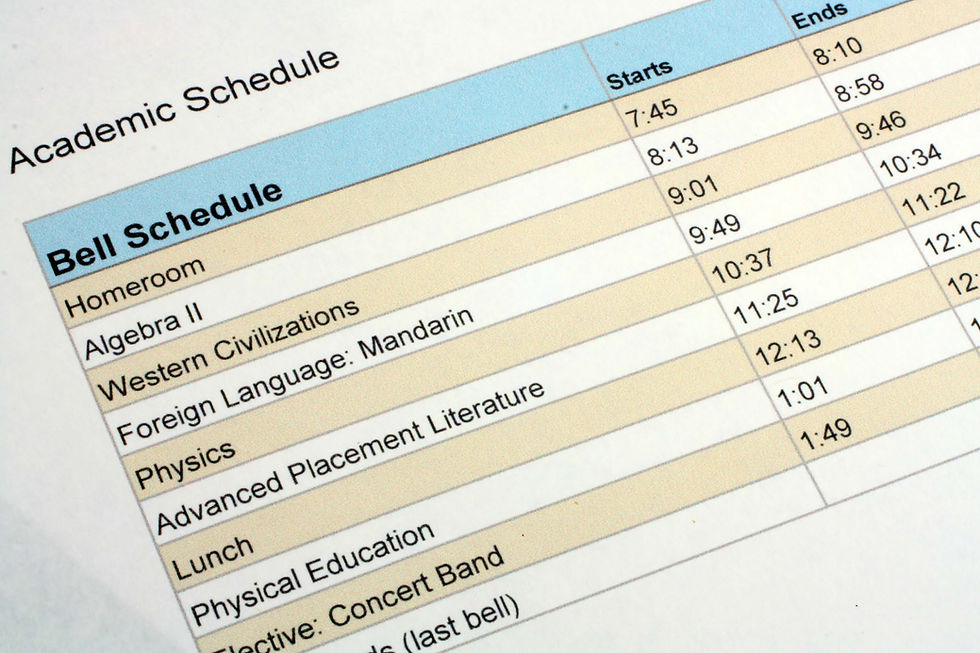College Decision Time: Key Factors for Neurodivergent Student Success
- Marie Guarnieri

- Mar 7, 2024
- 7 min read
Updated: Mar 10, 2025
By now the final college decisions are rolling in and in the next few weeks it is time to make the decision of where to spend the next four years!
It is exciting but also an overwhelming decision and for neurodivergent students or for students with learning disabilities, there are some additional factors to carefully evaluate to ensure the right fit.

Here are some key considerations to help guide your decision:
Disability Services & Accommodations

If you haven't already, it's time to have a detailed conversation with the learning disabilities office at each school that you are considering. Don't just skim the website - you'll want to get the full scoop on accommodations and support services they provide, such as note-taking assistance, extra time on tests, specialized advising, accommodated testing environments, assistive technology, and more.
Ideally, schedule a meeting so you can talk to someone directly and get a feel for their resources and approach. A robust, accommodating disability office can make a huge difference in your college experience. Also be sure to ask if they have social skills groups, support groups, or student organizations for neurodivergent students. Having that built-in community and structured social opportunities is invaluable.
Make sure to ask about the academic support options too. Find out if they have peer tutors, professional tutors, writing assistance, academic coaching, etc. How often can you utilize those resources and are there any fees involved? Consistent access to tutoring, writing help, coaching and the like could be essential to your success.
Having strong disability services, social supports, and academic support resources in place isn't just a nice-to-have, it's key. Don't settle until you really understand what each school offers. A little extra leg work now can help ensure you find the campus that checks all the right boxes for you.
Campus Community & Learning Environment

While online research is helpful, there's really no substitute for experiencing a campus in-person to get the full vibe. If you can, try to visit your top choices again and even sit in on a class or two in your intended major area. It's the best way to get a true sense of the learning environment. Are classes super-sized lectures or more seminar-style discussions? How available and approachable do the professors seem?
Pay close attention as you're walking around too. Get a feel for the student body - do they seem supportive and collaborative, or is there an intense, overly competitive atmosphere? If possible, arrange to meet up with a current student who has a similar learning profile as you. They can give you some invaluable first-hand insight into the academic experience and resources.
As you're exploring, keep picturing yourself there. Can you imagine being one of those students hanging out between classes? Do the facilities, classes, and overall vibe seem like a setting where you could thrive? Trust your gut on this one - you're looking for that energizing spark of "Yes, this could be my new home for the next few years!"
Social Life & Activities

An often overlooked but hugely important part of the college search? Identifying potential social outlets and communities that'll be a good fit for you. Take some time to reflect on the types of activities and interests that energize you. Are you a passionate gamer who would thrive in an esports club? Does the thought of joining an intramural sports team like flag football get you excited? Maybe you're an anime super-fan or chess devotee hungry to connect with fellow enthusiasts.
As you're researching each school, dig into the clubs, organizations, and social offerings they have. See what unique communities and "tribes" you could picture yourself joining. For neurodivergent students especially, getting plugged into an existing social circle like a neurodivergence student group can provide an extremely valuable built-in support system right off the bat.
While academics are the priority, having an established community where you can grow friendships and nurture your passions outside the classroom is invaluable too. It'll not only enrich your daily college experience, but could open doors to developing incredible lifelong interests and connections.
As you're exploring each prospective campus online and in-person, keep an eye out for those potential social homes that just seem to "click" with your vibe and interests. Finding your tribe can make all the difference in truly feeling at home.
Location & Accessibility

Beyond the big-picture factors like academics, student life, and accommodations, there are also some nitty-gritty practical logistics to consider. For many, proximity and accessibility can be make-or-break concerns.
How close is the campus to your hometown? If you're someone who recharges best at home or anticipates frequently needing to return for doctor's appointments, a college that's just a short drive away could be ideal. That makes getting home for breaks, long weekends, or even just a casual visit so much easier.
You'll also want to evaluate the campus layout itself. Is it pedestrian-friendly and easy to navigate between classes, housing, and facilities? Pay attention to factors like distances between buildings, availability of transportation options, cleared walkways, and more. An unnecessarily challenging campus terrain could make your daily routines more draining.
Safety & Inclusion

For many neurodivergent students, finding a campus where you can exist authentically and safely is crucial. If you hold marginalized identities, whether as an LGBTQIA+ person, religious/cultural minority, person of color, or any other underrepresented group, you'll want to carefully evaluate how truly welcoming and inclusive each prospective school is.
Dig into the campus climate and community. Is there an established presence of affinity groups, clubs, resource centers, etc. that provide built-in spaces for your specific identities? Having those existing supportive communities can be incredibly validating. See if you can connect with current students who share your background to get an honest perspective on what the lived experience is really like.
Pay close attention to signals about values – are there strong anti-discrimination policies and a visible celebration of diversity? Or do you pick up on more covert bias or hostility? Your ability to show up fully as yourself, free from harassment or stigma, is non-negotiable.
If you practice a religion, take note of worship spaces, religious student life organizations, accommodations for religious holidays and dietary needs, and other markers of a welcoming environment for your faith.
Finding a college where you don’t have to hide or camouflage who you truly are should be a priority – a campus should feel like a place where you can thrive authentically.
Academics & Curriculum

At the end of the day, academics are the core purpose of attending college. That's why ensuring each school on your list can provide an educational experience tailored to your interests, strengths, and needs is paramount.
Start by confirming the availability of your intended major(s) and diving deep into the specific coursework and requirements for those programs. You'll want an academic path that naturally aligns with how you learn best and what genuinely fascinates you. Scan through course descriptions and try to gauge if the content, teaching approaches, and overall curriculum design seems like it will enable you to thrive.
Also pay close attention to any university-wide general education or core curriculum requirements. Some schools offer an open curriculum with few required classes, while others have a great number of core classes that all students need to take. These mandatory classes may span different subjects outside your major. For students, particular requirements like foreign language, math or science classes could be challenging and counterproductive hurdles. If you know that there are classes you would like to avoid, you may want to prioritize schools that make accommodations or have fewer such requirements.
The breadth of elective options and unique subject areas can also be a selling point. Maybe you have niche academic interests you're hoping to explore, like paleontology, farm ecology, or pharmaceutical science. Ensure your prospective schools have the variety to nurture and build on those passions too.
Cost & Affordability

Your dream college may check every other box, but is it truly an option if the cost could bury you in insurmountable debt for years after graduating? As exciting as some schools may seem, it's crucial to carefully assess the full financial picture with a level head.
Start by understanding the comprehensive cost of attendance at each university - tuition, fees, room and board, books, travel, and all other anticipated expenses. For many families, those sticker prices can be enough to trigger sticker shock. Don't write off a school initially, however, until you've looked into all available financial aid.
Make sure to complete the FAFSA and CSS Profile for each college to get an accurate estimate of grants, scholarships, work-study, and loans you could qualify for. Explore institutional, local, state, federal, and private scholarship opportunities as well - every bit of free money helps make an education more affordable.
Compare financial aid packages across your target schools and calculate what your actual out-of-pocket costs could be annually and over four years. For students willing to take out some loans, aim to borrow no more than your expected first-year starting salary after graduation.
Sum It Up & Compare

So, to help you make that final important decision about where you will spend the next four years, it can be helpful to create a pros and cons list for each school you are seriously considering. Carefully evaluate how all of the factors discussed - disability services, academic support, potential social communities, location and accessibility, campus climate and inclusion, academic offerings that fit your learning needs and interests, and financial costs - align with your individual wants and needs as a student.
Once you have your pros and cons listed, you can compare the schools side-by-side. Identify which school seems to check the highest number of your most crucial "need to have" boxes, while also providing a healthy number of "want to have" bonus factors that would truly enrich your college experience.
The goal is to find the best overall fit - the institution that, when looking at the complete picture, sets you up with the greatest potential to grow academically, socially, and personally over the next four years.







Comments